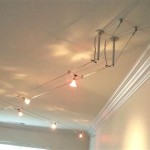Ceiling Light Wire Color: A Comprehensive Guide
When wiring ceiling lights, understanding the color-coding of the wires is crucial for ensuring proper installation and preventing electrical hazards. Each color represents a specific function and must be connected accordingly. This article will delve into the essential aspects of ceiling light wire color, providing a comprehensive guide for both DIYers and professionals. ### 1. Purpose of Wire Color-Coding Electrical wire color-coding serves two primary purposes:-
Safety:
By using different colors for different functions, it becomes easy to identify and differentiate between hot, neutral, and ground wires, minimizing the risk of electrical shocks or fires.-
Simplicity:
Color-coding simplifies the wiring process by making it clear which wires should be connected together and which should be kept separate. ### 2. Standard Wire Color Designations In most countries, the following standard wire color designations are used in ceiling light wiring:-
Black or Red:
Hot wire (carries live current)-
White:
Neutral wire (completes the circuit)-
Green or Bare Copper:
Ground wire (protects against electrical shocks) ### 3. Identifying the Hot WireThe hot wire is the one that carries the electrical current from the power source to the light fixture. It is usually identified by its black or red color. If unsure which wire is hot, use a voltage tester to check for the presence of electricity.
### 4. Importance of Neutral WireThe neutral wire completes the electrical circuit by providing a path for the current to return to the power source. It is typically identified by its white color. Connecting the neutral wire correctly is crucial as a mistake can lead to the fixture not working properly or even causing electrical hazards.
### 5. Ground Wire ProtectionThe ground wire provides a safe path for excess electricity to flow in case of a fault. It is usually identified by its green or bare copper color. Connecting the ground wire properly is essential for protecting against electrical shocks and ensuring safety.
### 6. Exceptions to Color CodesWhile the standard wire color designations are widely followed, there are occasional exceptions. In older buildings or DIY projects, wires may not conform to current color-coding practices. Always refer to local electrical codes and consult with qualified electricians if unsure about the wire colors.
### 7. Safety PrecautionsWhen working with electrical wiring, always prioritize safety by following these precautions:
- Turn off the power at the electrical panel before starting any work.
- Use proper tools and safety gear, including insulated gloves and safety glasses.
- If uncertain about any aspect of the wiring process, consult with a qualified electrician.
### Conclusion Understanding ceiling light wire color is crucial for safe and efficient lighting installations. By adhering to standard color-coding practices and observing safety precautions, DIYers and professionals can ensure proper wiring, minimize electrical hazards, and create a well-functioning lighting system.
Wiring A Ceiling Fan And Light With Diagrams Ptr

Advice On Ceiling Light Wiring English Forum Switzerland

Wiring A Ceiling Fan And Light With Diagrams Ptr

How To Install A Ceiling Light Fixture Diy Family Handyman

Advice On Ceiling Light Wiring English Forum Switzerland
What Is The Gray Wire Coming From Ceiling Quora

Wiring A Ceiling Fan And Light With Diagrams Ptr

How To Install A Ceiling Light Fixture Diy Family Handyman

Light Switch Wiring Diagrams Do It Yourself Help Com

Wiring A Ceiling Fan And Light With Diagrams Ptr
Related Posts








